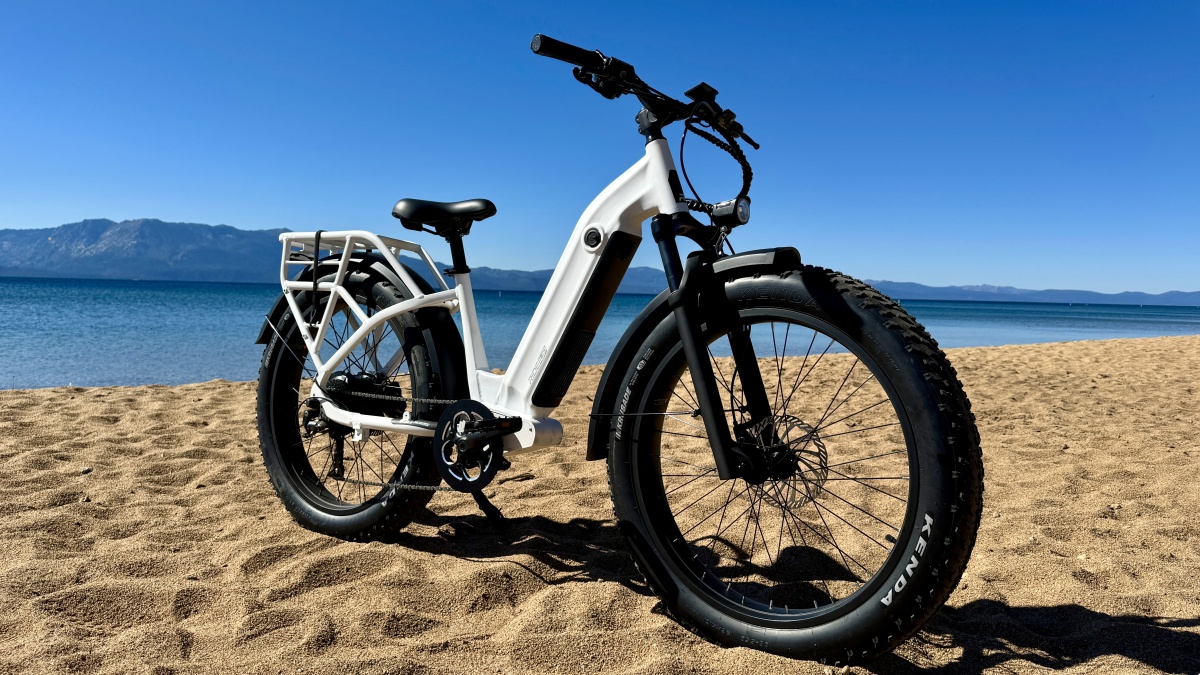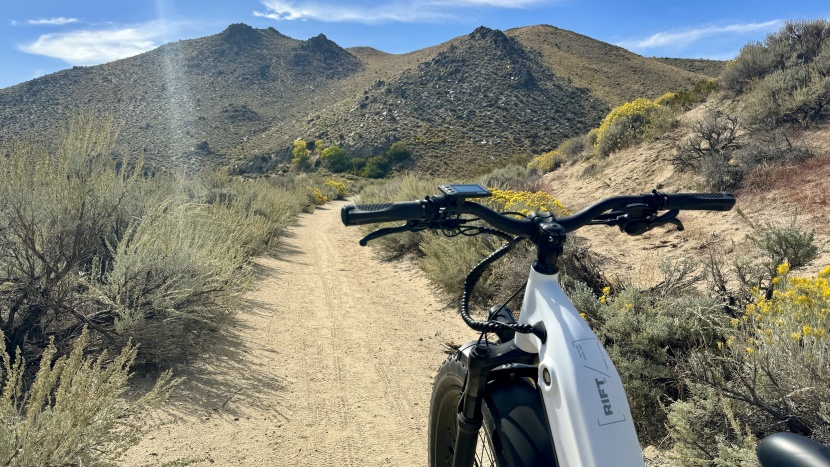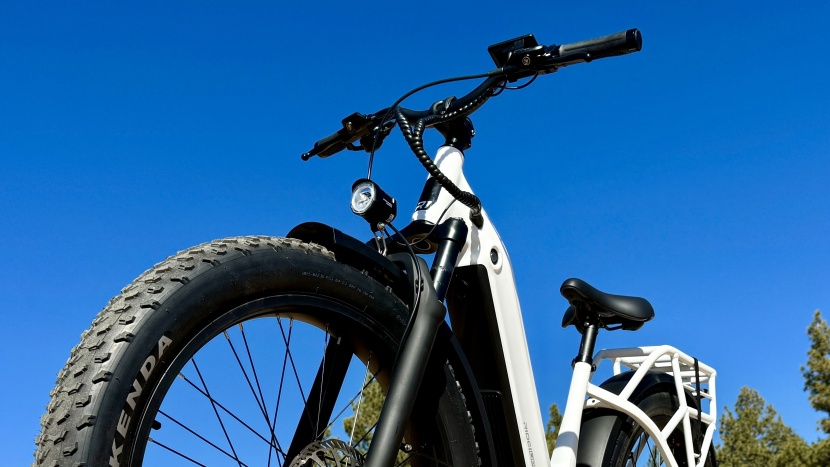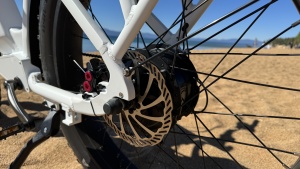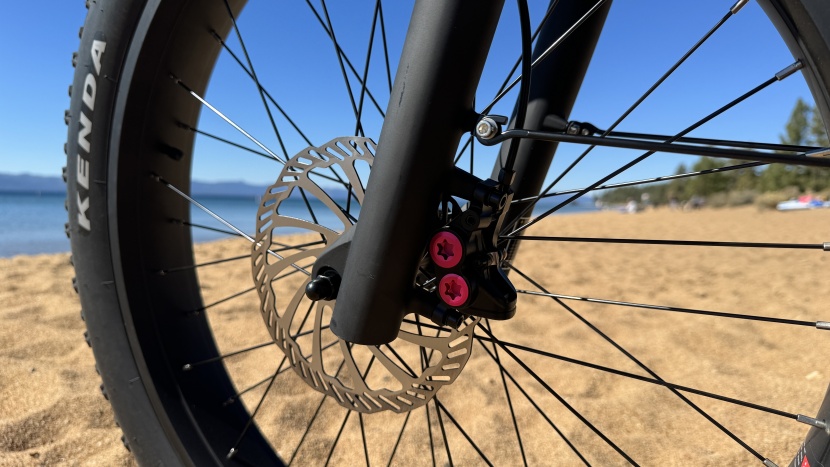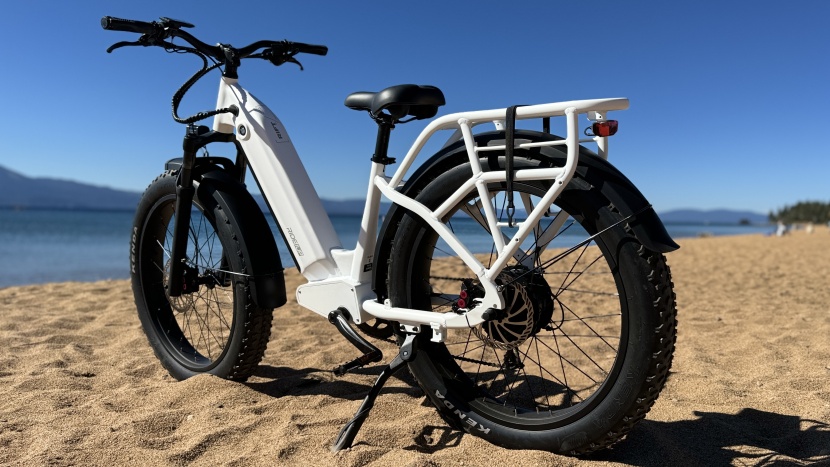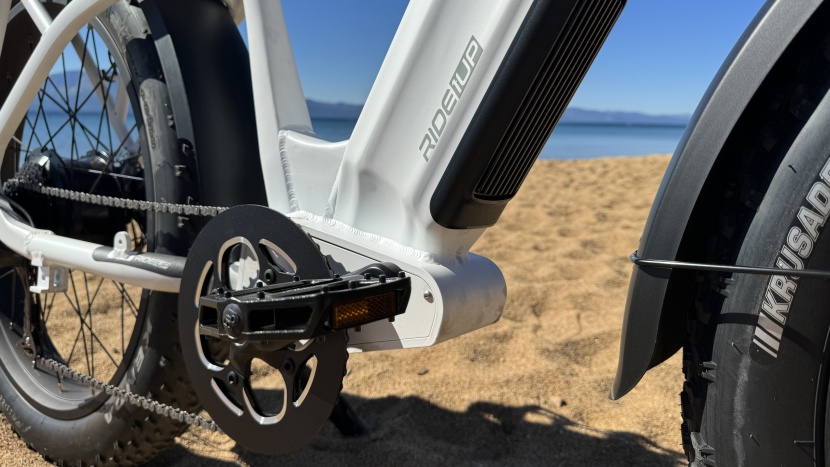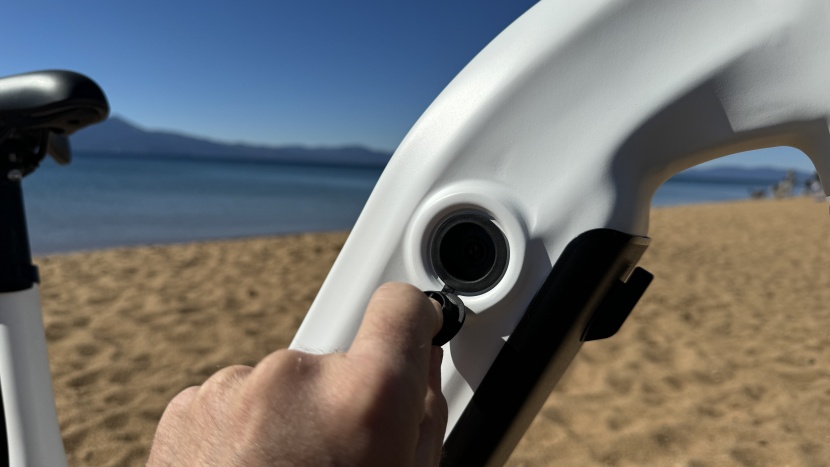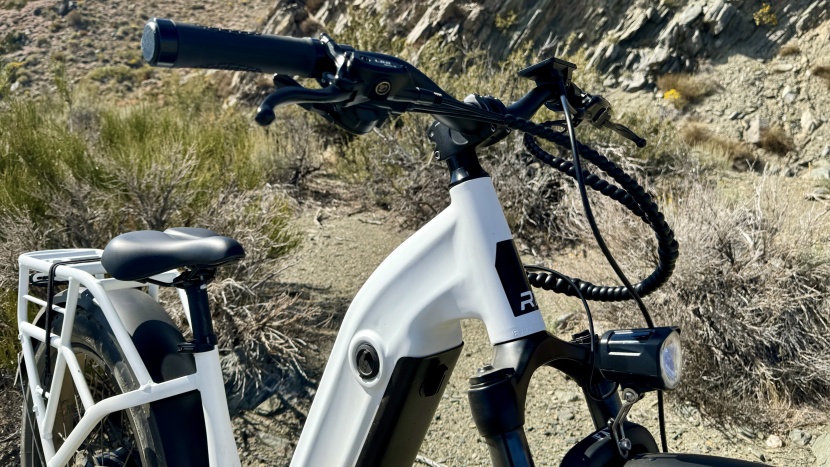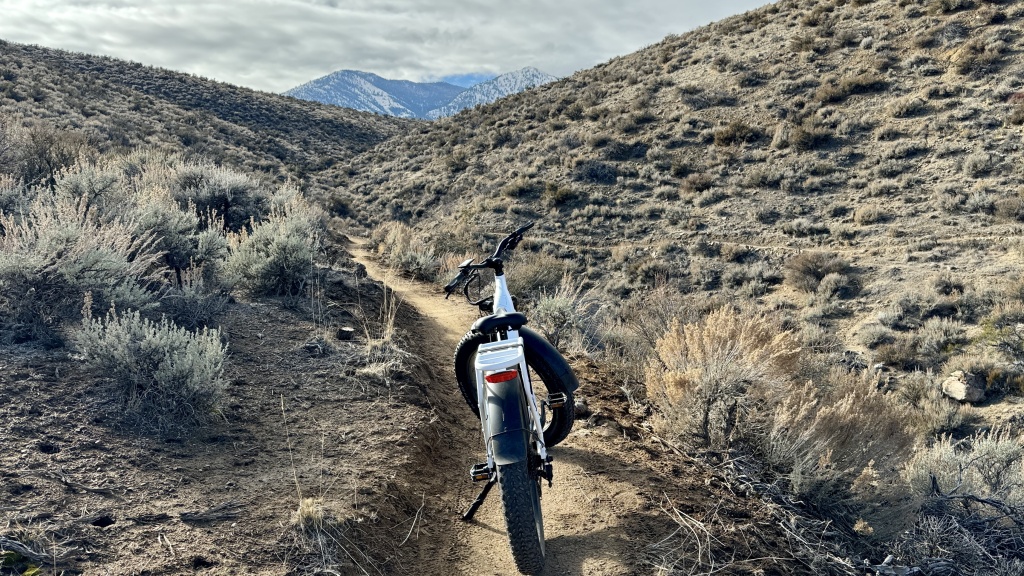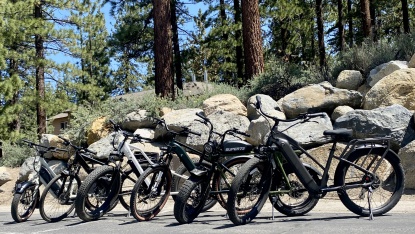Our Verdict
Our Analysis and Test Results
Founded in 2018, Ride1Up manufactures a full line of cost-effective e-bikes that they sell directly to the consumer. The Rift is their All-terrain fat tire e-bike designed for discovery and pleasure. The design of the Rift prioritized comfort and capability over weight and convenience. A massive 960 Wh battery powers the 750W motor, pushing it to Class 3 speeds of up to 28 mph with pedal assist or 20 mph with the throttle alone. The ride quality is cloud-like, but this heavy-weight bike can feel like a lot to manage. With similar specs and performance, the Rift tied with the Aventure for our best electric fat bike. We gave the award to the Aventon as it has a better display and a more manageable weight. The Rift has more power and can carry more on its welded rack, but its weight and off-center screen are marks against it. Both bikes are excellent, but their features set them apart. Read on for more.
Ride
Given this bike's style, you won't be surprised that the Rift is really comfortable to ride. The relatively upright riding position puts very little weight on the rider's hands. A suspension fork and big squishy tires isolate the rider from bumps and vibrations. The bike handles the road in a relaxed manner, the slack headtube slowing the steering, and a long, forgiving wheelbase. The 70-degree seat tube angle isn't designed for efficient climbing, but it really doesn't matter with this much power on tap. The ride quality is excellent, and even after many rides, the bike feels comically capable. You're not crushing cars in an arena, but this bike feels like a descendant of a monster truck. Like driving a truck or large SUV, the bike's added size and mass give it more confidence than actual trail prowess. The overall package is equal parts awesome and absurd; while incredibly capable, the size and weight of this bike are the elephant in any room.
While the knobby tires and suspension fork give it that mountain bike vibe, the Rift is not. These features work to lessen the vibrations and increase the rider's comfort but do less to increase traction while off-road. 120mm of suspension travel up front is enough to smooth out significant bumps and turn a snowy road or a sandy gravel trail into smooth transit. The plump, 4" Kenda Krusade tires allow the bike to float over terrain that other bikes would get stuck in. The short knobs and fenders don't prepare this bike for use in the mud, but that's about the only surface it won't readily traverse.
Like most of the other fat tire bikes we tested, the Rift has an aware yet relaxed seated position that is conducive to cruising. The aluminum riser handlebar features 9 degrees of sweep and measures 680mm, which isn't quite as wide as we would have liked. A wider handlebar would give the rider a bit more leverage, which is welcomed on a bike of this size. Ergonomic grips and a gel saddle are the quality touch points that you interact with, and help give the bike a high-end, comfortable feel. The KNUS Ergo Gel Mtb Saddle is an ergonomic saddle that most riders should appreciate; those looking for even more squish might choose to add a suspension seat post, you won't notice the additional weight.
The Rift can be had in two different frame styles, ST and XR. The ST or step-through version we tested is recommended for riders from 5' 1" to 6' 2" and has a step-over height of 19" inches, making entry exceptionally easy. The XR (step-over) version of this bike is recommended for riders from 5' 6" to 6' 4" has a 29" top tube which isn't as easy to mount and dismount. Long gone are the days of building these bikes for women in long dresses; the step-through tube is all about convenience. There's no performance reason to opt for a high top tube, but if you're above 6' 2", it would be the sensible choice.
The parts chosen for the Rift are particularly well thought out; the bike's additional weight requires some special considerations. Heavy-duty LBN 4-piston hydraulic disc brakes and 180mm rotors handle the stopping duties, while a Shimano Altus 8-speed drivetrain handles the rider input and gearing. The beefy wheels feature 12 and 13-gauge spokes and puncture-resistant tires. The Shimano SL-M315 shifter is a favorite for this application, featuring a trigger that doesn't require moving your thumb over the bar to shift, an inexpensive feature that makes a big difference.
The 120mm suspension fork features a hydraulic lockout that turns the suspension off, which enhances efficiency, but we rarely bothered to use it. A Buchel Shiny 80 lux headlight runs off the bike's main battery, so you'll never be caught in the dark with no light. Riders who plan to ride in the dark more than occasionally would likely want some additional illumination. A tail light integrated into the rack features a working brake light. The rear rack is the same welded style we see on other Ride1Up models and can haul loads of gear. The rack is compatible with Connect+ accessories, panniers, child carriers, and even a passenger kit, allowing you to carry a friend up to 150 pounds.
Range
The Rift's enormous battery gives it tremendous range despite the bike's size and weight. Riders wanting to explore off the beaten path can breathe easy knowing the Rift has a longer range than any of the other fat tire ebikes we've tested. We perform range testing on the same course, using the same weight rider, and do not pedal the bikes during our test. The course features gently rolling hills and diverse terrain that allow us to evaluate ride quality and comfort. Starting with a fully charged battery, we piloted the Rift for 29.9 miles with 1,717 feet of elevation gain at an average speed of 15.8 mph using the throttle only. This bests many of the e-bikes we've tested, but notably the other fat tire e-bikes. Range may be even more important on a bike like this because riding it once the battery has been depleted isn't an experience we'd like to repeat. We could travel much further by using the bike's pedal assist; just how far would depend on the rider's input. Ride1Up claims a range of 45-60 miles, and that seems totally reasonable.
Power
Acceleration is quick, with the 750W producing 95Nm of torque. There is ample assistance in the pedal support mode, and the bike can handle most terrain using the throttle alone. There's sufficient torque to start from a dead stop, even on a fairly steep grade. This bike has no problem reaching 20 mph with the throttle and 28mph using pedal assist. Due to its long wheelbase, the bike is quite stable at speed and enjoyable to ride above 20mph. Activating the throttle is simple, with a small thumb lever on the left side, next to the grip. Starting is as easy as pressing the lever; you needn't contribute any power to set the bike in motion. When we performed a test of this bike's acceleration, the Rift raced to 20 mph in just 7.5 seconds on level ground. On our uphill acceleration test, the Rift powered to 19.6 mph, slowing to 15.6 mph at the hillest steepest.
Five levels of pedal assist give the rider differing levels of support. The amount of power added increases as you move through the levels; level one feels calm yet supportive, and level five feels like cheating physics. This bike relies on a cadence sensor to determine what input level to add; it works by measuring the speed at which the cranks turn. This type of sensor isn't as accurate or seamless as a torque sensor, which measures how much pressure is applied to the cranks. This results in power being delivered with a bit less finesse. That said, there were no issues with traction or safety; it's mostly a nuance to the level of acceleration.
Interface
Ride1Up uses a KD218 all-in-one head unit with buttons integrated into the display. The display is located on the left side of the handlebars, where the controls can be easily accessed. The display shows the current speed, the battery's state of charge, and PAS mode; average speed, max speed, and time are all available by toggling the controls. The battery's state of charge view can be changed from a percent to voltage, which is said to be more accurate.
This screen is generally agreeable, but we prefer centrally located displays like the one found on the Aventon Aventure.2. There are three buttons on the left side of the display that power the bike and adjust the pedal assist settings. The headlight is activated by holding down the + button, which also dims the screen for night visibility. Holding the - button engages walk mode, where the bike propels its own weight at walking speed. This can be a nice feature that prevents you from having to push the full weight of the bike should you choose to walk up a steep hill, especially with this bike.
The massive battery slots into the underside of the downtube and is removable for security, off-the-bike charging, or transport. The 11.4-pound battery is simple to remove and might lower the bike weight enough to be used on some bicycle racks. The bike and battery have an IP-65 water resistance certification, which means its resistant to water ingress from every direction but shouldn't be submerged; there are no issues with riding this bike in the rain.
Assembly
For a direct-to-consumer electric bike, the Rift was pretty easy to put together. The hardest part of the build is moving the box to your assembly location. The 100-pound cardboard enclosure is anything but easy to move. With the included tools and directions, it took about 40 minutes to fully assemble the Rift. If you're good at following directions, you'll have no problem putting this bike together; there's even a video tutorial on how to guide you along on their website. If you're not good with directions or just don't want to build the bike yourself, your local bike shop should make quick work of it.
Once the bike is unboxed and assembled, you'll need to set the proper tire pressure and charge the battery. Adjust the handlebar and saddle height to your liking, and you'll be ready to ride. Ride1Up provides a nice set of ball-end Allen wrenches, printed directions, and a cool beanie.
Should You Buy the Ride1Up Rift?
If you want an ebike that won't be deterred by the type of terrain you ride or want a fun, capable and comfortable bike to explore on, the Rift is a compelling option. With a relaxed disposition, confidence-inspiring tires, and plenty of range, the Rift can go beyond the trail. Our recommendation for most people is to buy the step-through version of this bike, as it makes getting on and off much easier. This is a fantastic bike; it's not easy to transport, but it's a dream to ride.
What Other Electric Commuter Bikes Should You Consider?
If this style of fat tire ebike appeals to you, the Aventon Aventure.2 is a spectacular bike with a nicer display than the Rift and great ride quality. The bike has a similar range to the Rift, but it lacks the versatile welded rear rack. The Aventon is ten pounds lighter, has a higher weight capacity, and almost the same range. The Blix Ultra was another contender, but its range and display were both disappointing. If giant tires aren't a prerequisite, the Ride1Up Cafe Cruiser is a chill cruiser-style bike that we not only liked, but found powerful and comfortable.


